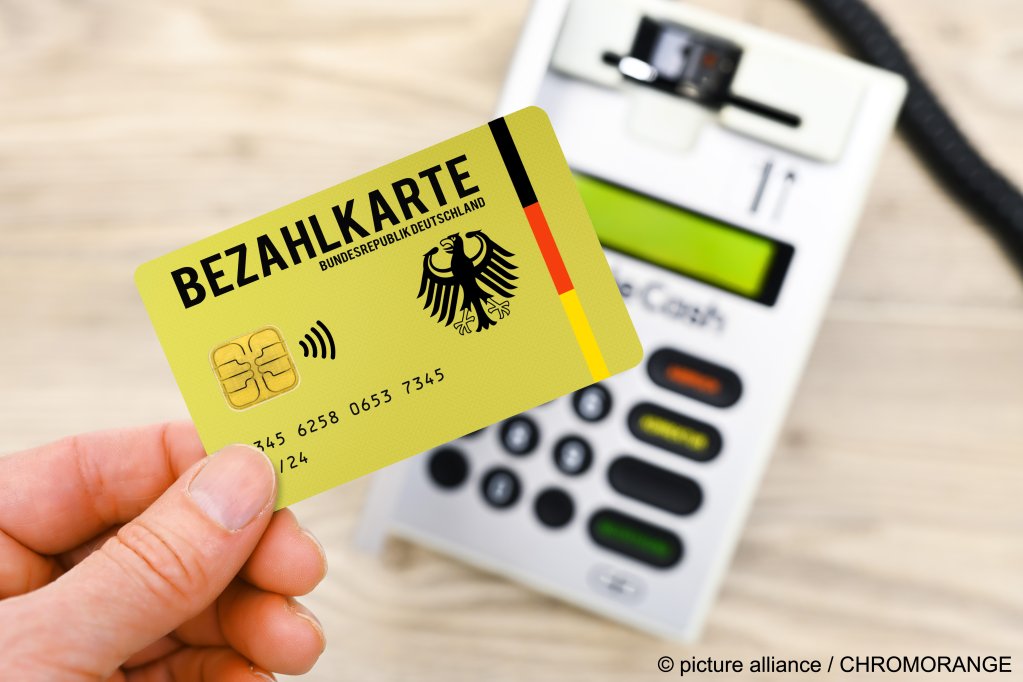Asylum seekers in North Rhine-Westphalia, Germany's most populous state, are soon to receive the new digital debit card. Some are worried that they will face problems and discrimination.
It’s true in Germany that cash – that is actual notes and coins – is becoming a rarity, as more and more people choose to pay by card or with their cell phone.
But what if you had no choice, and you had to use a special card reserved only for foreigners receiving state benefits? This is soon to be the situation facing asylum seekers in the state of North Rhine-Westphalia (NRW), and many are worried.
From January next year, instead of cash, asylum seekers in state-run centers will start using a distinctive plastic card with an electronic chip. The most that can be withdrawn in cash each month using the card is 50 euros – enough to buy about eight Big Macs. If you can prove you need more, because you have small children, for example, the amount can be increased.
Divisive move
The highly controversial debit card is being introduced at different times in Germany’s various cities and states. Most state governments have welcomed the new system because they argue it removes a major 'pull factor' – cash payments that enable asylum seekers to send money to family members abroad.
Others, including some politicians from the Greens and the Left Party, are firmly opposed to the card, saying it stigmatizes migrants and adds an unnecessary level of complexity.
Some have even challenged the payment card in the courts on the grounds that it undercuts the basic subsistence level guaranteed to every individual under German law.
Read AlsoGermany: Bavarian court orders alternative payments to payment cards

picture alliance / CHROMORANGE | Christian Ohde
'I would be ashamed'
Some asylum seekers who have been asked for their views feel the debit card adds to the social stigma they face. "I would be ashamed if others saw me using a card like that. It shows that you are poor," one young woman at the Shanbi Bazaar, a popular market in the Cologne suburb of Porz, told the public radio station WDR.
InfoMigrants has heard similar complaints. Abdulkader Haj Ahmad, a Syrian who works with the migrant group Violass in Altenburg in Germany’s east, said not long after the city became one of the first to introduce the card that he believed it was being used to discriminate against asylum seekers.
Others who spoke to WDR knew nothing about the system soon to be rolled out in NRW. "No, I haven’t heard of that," said Ahmad from Syria, outside an asylum center in Cologne’s north. "Perhaps it makes sense, because that way, the money won’t be stolen," he added.
But Ahmad’s younger brother Karim raised a concern shared by many people who have already been using the card: What if you need to buy something from a shop or a market where the cards aren’t accepted?
At the same facility, another asylum seeker from Afghanistan worried, "I’ve heard that you can’t buy things everywhere with it. That’s a problem."
Read Also'People look at you funny' – asylum seeker payment cards in Germany come with restrictions, stigma
'We want to earn our own money'
There are other restrictions with the payment card that are already causing problems for asylum seekers, rights groups say. The German Society for Civil Rights (GFF) says many things that can only be paid by bank transfer, like bill payments or setting up an internet connection, as well as online shopping, are not possible with the card.
Some asylum seekers also question the claim that asylum seekers have been cheating the system by sending cash out of Germany to relatives abroad, and that the payment card is needed to remove this incentive to come to the country.
In a hotel in Dellbrück, an Afghan mother complained to WDR: "200 euros a month is barely enough to live on. How can you send money abroad with that? If you send money, you’re working. You can’t do that with social security."
It is not that she is ungrateful to be in Germany, the woman explained, telling WDR she would just prefer that asylum seekers were given more autonomy: "We hope that we will soon be able to earn our own money – without a card, without restrictions."
The original WDR item in German containing quotes from asylum seekers in Cologne can be found here.
